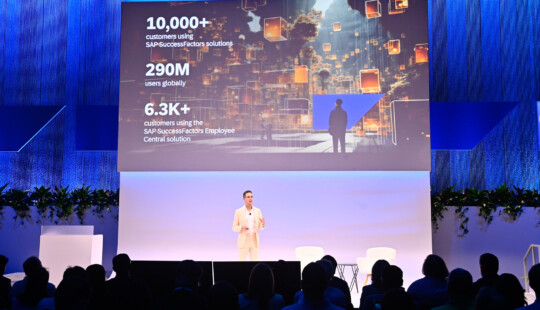WALLDORF — Human resource (HR) managers across global organizations expect to be faced post pandemic with a bifurcated workforce of remote and on-site workers, creating challenges balancing employee needs, organizational goals, policies and culture, according to a survey released today by Oxford Economics, the Society of Human Resources Management (SHRM) and SAP SE (NYSE: SAP).
The report surveyed HR leaders across 10 countries: Australia, Brazil, Canada, China, Germany, India, Mexico, Spain, the United States and the United Kingdom.
Some 78% of U.S. respondents and 63% of non-U.S. respondents said they expect flexible work policies to be a talent differentiator, according to the report “The Future of Work Arrives Early: How HR Leaders Are Leveraging the Lessons of Disruptions.” However, more than half of U.S. respondents and 38% of non-U.S. respondents said that establishing a culture that supports remote employees will be one of the top three challenges when the pandemic subsides.
The report also found that despite employee readiness to learn new skills, few HR leaders are planning to invest in learning programs for reskilling and upskilling over the next 12 months. Outside of the United States, only 38% of respondents plan to invest in these programs. That drops to 22% among U.S. respondents.
“While HR leaders across the globe ranked maintaining productivity as their biggest challenge, it’s critical that we not lose sight of long-term strategies around learning and reskilling, and diversity, equity and inclusion,” SAP SuccessFactors President Jill Popelka said. “The urgency for more agile processes, easier access to data and the ability to support remote work is accelerating digital transformation. It’s critical that leaders develop a culture of continuous learning and inclusion. This will enable workforces to drive needed transformation projects, even during a period of unprecedented change.”
More than 80% of U.S. respondents said they were likely to recommit to corporate culture and value, and practice inclusive hiring and promotion. However, when compared with other countries, commitment in the United States to take specific actions toward these goals is less than other countries. For example, only 46% of U.S. respondents said they are likely to adjust wages or salaries to address pay inequities, compared with 85% in China and 64% in the United Kingdom. Furthermore, only 47% of U.S. respondents said they are likely to change structure or benefits to foster inclusion, compared with 73% in Mexico and 67% in Spain.
Additional key findings from the report include:
Challenges to Maintain Productivity Could Delay Long-Term Planning in Reskilling
- Maintaining productivity given new ways of working is ranked as the biggest challenge for HR leaders. In Brazil, China, Mexico and Spain, more than 60% of HR leaders cited this as the biggest challenge.
- Remote collaboration tools will see the most investment, ahead of analytics, technologies to ease the return to work, such as testing and tracing, and learning programs for reskilling.
- Additionally, organizations are taking a buy-versus-build mentality, with most hires in the coming months expected to be new to the organization, rather than promoted within.
Remote Work Persists, Creating a Two-Tiered Workforce
- Overall, organizations globally agree that remote work will be a talent magnet in the coming years and is viewed by many as a long-term investment. For example, 64% of U.S. respondents and 57% of UK respondents say they expect to have greater flexibility regarding remote work as a result of COVID-19.
- However, respondents in China, India, Mexico, Spain and Germany face different circumstances and were most likely to say their employees can work from anywhere but do not have the technology or environment they need. In these countries, respondents were the most likely to say they are investing in remote collaboration tools and mobile platforms.
- Service and field workers, general staff and customer service workers are also less likely to have the environment or technology to work remotely, compared to functions such as HR, sales, marketing and finance.
“This has been a year of dramatic challenges for organizations around the world, and human resource executives have been at the forefront of navigating their organizations through this unprecedented time,” said SHRM President and CEO Johnny C. Taylor Jr., SHRM-SCP. “To realize the future of work, human resource executives and their colleagues on the leadership team must accelerate their efforts to establish culture, invest in talent and address diversity, inclusion and equity to drive their organizations forward. While HR executives continue to work through these difficult times, there is a great opportunity to lead meaningful change for the workplace and beyond as the report shows.”
Download “The Future of Work Arrives Early: How HR Leaders Are Leveraging the Lessons of Disruption” report and the U.S. country report.
For more information, visit the HR and People Engagement area of SAP.com and the SAP News Center. Follow SAP on Twitter at @SuccessFactors and @SAPNews.
About SAP
SAP’s strategy is to help every business run as an intelligent enterprise. As a market leader in enterprise application software, we help companies of all sizes and in all industries run at their best: 77% of the world’s transaction revenue touches an SAP system. Our machine learning, Internet of Things (IoT) and advanced analytics technologies help turn customers’ businesses into intelligent enterprises. SAP helps give people and organizations deep business insight and fosters collaboration that helps them stay ahead of their competition. We simplify technology for companies so they can consume our software the way they want — without disruption. Our end-to-end suite of applications and services enables business and public customers across 25 industries globally to operate profitably, adapt continuously and make a difference. With a global network of customers, partners, employees and thought leaders, SAP helps the world run better and improve people’s lives. For more information, visit www.sap.com.
Note to editors:
To preview and download broadcast-standard stock footage and press photos digitally, please visit www.sap.com/photos. On this platform, you can find high resolution material for your media channels. To view video stories on diverse topics, visit www.sap-tv.com. From this site, you can embed videos into your own Web pages, share video via email links, and subscribe to RSS feeds from SAP TV.
For customers interested in learning more about SAP products:
Global Customer Center: +49 180 534-34-24
United States Only: 1 (800) 872-1SAP (1-800-872-1727)
For more information, press only:
Samantha Yerks, SAP, +1 (914) 918-6087, samantha.yerks@sap.com, ET
SAP Press Room; press@sap.com
Any statements contained in this document that are not historical facts are forward-looking statements as defined in the U.S. Private Securities Litigation Reform Act of 1995. Words such as “anticipate,” “believe,” “estimate,” “expect,” “forecast,” “intend,” “may,” “plan,” “project,” “predict,” “should” and “will” and similar expressions as they relate to SAP are intended to identify such forward-looking statements. SAP undertakes no obligation to publicly update or revise any forward-looking statements. All forward-looking statements are subject to various risks and uncertainties that could cause actual results to differ materially from expectations. The factors that could affect SAP’s future financial results are discussed more fully in SAP’s filings with the U.S. Securities and Exchange Commission (“SEC”), including SAP’s most recent Annual Report on Form 20-F filed with the SEC. Readers are cautioned not to place undue reliance on these forward-looking statements, which speak only as of their dates.
© 2020 SAP SE. All rights reserved.
SAP and other SAP products and services mentioned herein as well as their respective logos are trademarks or registered trademarks of SAP SE in Germany and other countries. Please see https://www.sap.com/copyright for additional trademark information and notices.
Please consider our privacy policy. If you received this press release in your e-mail and you wish to unsubscribe to our mailing list please contact press@sap.com and write Unsubscribe in the subject line.



